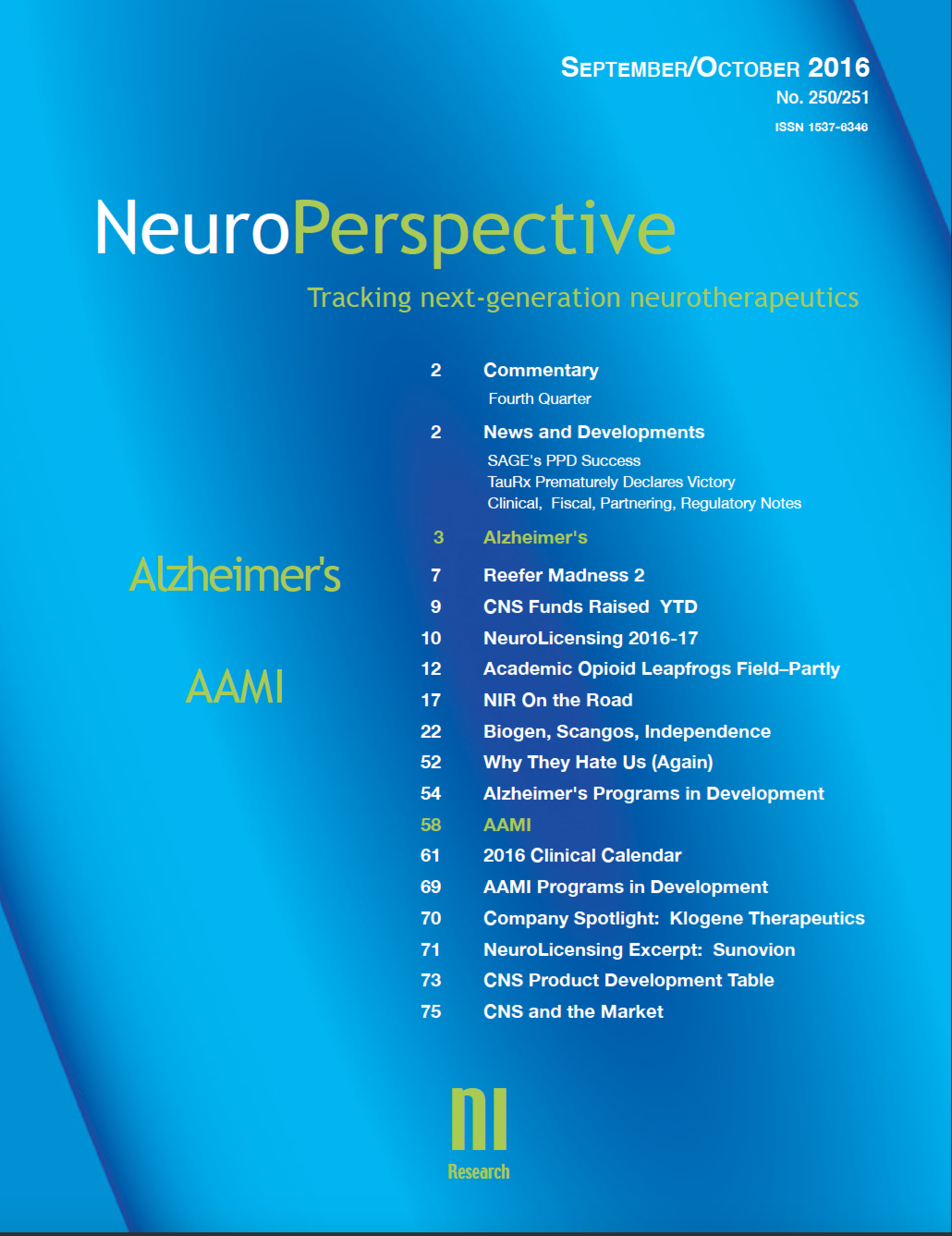NeuroPerspective has released its Spring 2023 issue, featuring comprehensive reviews of neurotherapeutics programs addressing Schizophrenia, ALS, and Addiction.
The Schizophrenia area had been relatively moribund since the field became dominated by Second Generation (‘atypical’) antipsychotics, but that is now changing, as novel mechanisms aimed at the three domains of schizophreniform illness are maturing. The most tangible advance is in the slow-to-arrive début of muscarinic agonists, with Karuna‘s KarXT having performed strongly in two PhIII trials. While the second PhIII saw the readout for negative symptoms slip below statistical significance at one timepoints, Karuna is preparing to file the NDA midyear, and we have no doubt as to KarXT’s approvability. Negative symptom impact will not be part of the label, since the protocols used thus far could be at risk of pseudospecificity, but the negative sx data will be usable in marketing KarXT. Somewhat behind time wise are a flock of muscarinic agonists which hope to emulate KarXT by being highly selective for M4 or M1/M4 subtypes: Cerevel, Neurocrine/Sosei, and Maplight stand out in this group. New approaches to broad spectrum antipsychotic impact are also coming to fruition, with Otsuka/Sunovion‘s ulotaront finishing PhIII during 3Q:23. Cognitive impairment has been a challenging indication, one of the more intriguing programs is Neurocrine‘s DAAO inhibitor, licensed from Takeda, in PhII, while Boehringer Ingelheim has gone all in on iclepertin, in PhIII. Neurostructural interventions that might have a disease-modifying component are much more preliminary in their development, though Oryzon Genomics has their epigenetic modulator vafidemstat in PhII.
ALS has been the neurodegenerative disorder where FDA standards have traditionally been relatively lax, as was the case for Amylyx‘s Relyvrio, whose approval was largely attributable to coaching by the then-head of neuroscience for the FDA. The next example of Agency flexibility is like to be Biogen/Ionis‘ tofersen, for the rare SOD1 mutation form of ALS. Genetically defined subgroups have been more difficult targets than expected, and midstream disease-modifiers may be relatively more accessible: Programs from QurAlis, AbbVie/Calico, Denali, Sanofi/Denali, and Annexon are in the clinic, preclinical programs of interest include those from Libra Therapeutics, NRG Therapeutics, and Aclipse Therapeutics.
Addiction receives less pharma investment and attention than even stroke/TBI, and this has not really changed despite the onslaught of the opioid epidemic, exacerbated by the toxic potency of fentanyl. Orexin-1, GPR139, and mGluR5 inhibitors are three next-gen mechanisms of interest. Psychedelic compounds, particularly ibogaine and/or its analogs, are intriguing candidates for addiction disorders as well.
The issue also includes a Company Spotlight appraisal of Noema Pharma; a Company review sample from NeuroLicensing 2023, and a review of significant clinical, fiscal, partnering, and regulatory events from 1Q:23.
A one-year (1-5 user) subscription to NeuroPerspective is $3100. A 6-10 user subscription is $5250. Other customized userbase and startup pricing options are available. The Spring issue is being made available as a single-issue purchase, for $850.
100 pages.
Read More
